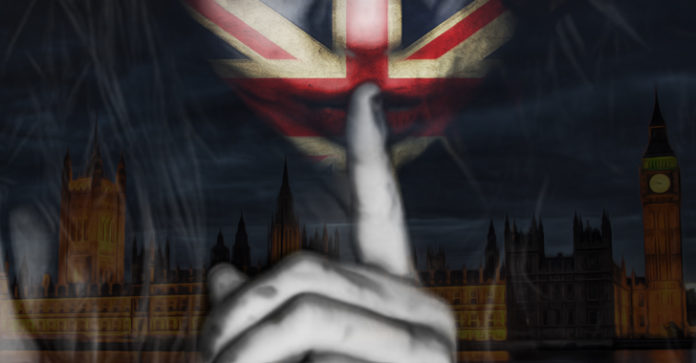
Written by Carey Wedler at theantimedia.org
The U.K. government is eager to expand already extensive spying powers to ban iMessage, Whatsapp, and Snapchat because the government cannot bypass their encryption features. The proposed ban was added to a revived version of a previously repealed British surveillance bill.
Cameron first indicated his advocacy of the ban following the Charlie Hebdo attack in Paris in January, justifying it by asking—without a hint of embarrassment—“In our country, do we want to allow a means of communication between people which […] we cannot read?” He quickly answered his own question: “‘No, we must not.’”

Cameron’s suggestion was part of a larger push to revive the sweeping Communications Data Bill, which detractors commonly refer to as the “Snooper’s Charter.”
By May, the government had announced it would introduce an investigatory powers bill that extended the powers granted in the Communications Data Bill and strengthened the government’s ability to engage in bulk data collection. The Home Office claimed it would “better equip law enforcement and intelligence agencies to meet their key operational requirements” by allowing them to monitor communications more invasively.
Now, the bill is pushing forward. It includes a provision to ban WhatsApp, iMessage, and Snapchat “to stop people from sending any form of encrypted messages.” The bill also requires internet companies to keep full records of all communications on their platforms. This includes Facebook and Google, which would be required to hand over whatever information the government wants, when it wants it.
In arguing in favor of the expanded powers, Cameron said, “We have always been able, on the authority of the Home Secretary, to sign a warrant and intercept a phone call, a mobile phone call or other media communications.”According to Big Brother Watch, British police file a request for communications data every two minutes. Their requests are granted 96% of the time by the Home Office, a rate almost as high as that of American “rubber stamp” FISA courts. Like Cameron, American officials have criticized encryption as a danger to national security.
By banning all forms of communication exempt from government surveillance, the U.K. government is straddling a dangerous line between “national security,” as it claims to bolster, and the basic privacy rights of its citizens. Many would argue it has long since crossed that line, as intensive surveillance measures have been in place for years. Cameron pontificated this week that “…the question we must ask ourselves is whether, as technology develops, we are content to leave a safe space – a new means of communication – for terrorists to communicate with each other.”
Not everyone in the U.K. agrees with the prime minister’s privacy-versus-security dichotomy. “We take no issue with the use of intrusive surveillance powers per se – targeted surveillance can play an important part in preventing and detecting serious crime,” said Liberty, a human rights and civil liberties advocacy group in the U.K. “But the current regime just doesn’t provide sufficient safeguards to ensure that such surveillance is conducted lawfully, and in a necessary and proportionate way.”
Former Deputy Prime Minister Nick Clegg, who helped to block the previous version of the Communications Data Bill when he was in office, echoed a similar sentiment about the impending new policy.
“It’s not harmless. It would be a new and dramatic shift in the relationship between the state and the individual,” he said.
“People who blithely say they are happy for their communications to be open to scrutiny because they have ‘nothing to hide’ have failed to grasp something fundamental about open democratic societies: We do not make ourselves safer by making ourselves less free.”
Conservatives in Parliament are expected to pass the bill (previously killed by liberal Democrats in the previous administration) with enforcement as early as 2016, even as computing experts warn the policies may enable the very terrorists they are intended to thwart.
AnonHQ recommends: Protect your PC & mobile devices from hackers and governments & surf and download anonymously
Get Your Anonymous T-Shirt / Sweatshirt / Hoodie / Tanktop, Smartphone or Tablet Cover or Mug In Our Spreadshirt Shop! Click Here<





This Cameroon guy… A special kind of stupid.
The animal condition is to adapt to the environment. No matter what the government does the criminals will stay a step ahead, so why keep digging?
Every hole has a bottom, has it?
What can we do to stop it? It seems to me, David CaMORON doesn’t need permission to do shit these days, the guy literally slithers his way to enforcement, whether we want it or not.
Someone, anyone, please remove this false pretender out of power and into the gutter. Getting a fucking Kardashian to make our laws, i spit on the very prospect, and i imagine that quite a number of people feel the exact same way.
Down with the tories and their EVEL Agenda.
they are doing it cause whatsapp (fb) is an american company with the dury to show all dataset to the nsa. cause its encrypted they can have all information of people who naively use this app….
well, when the people dont realize that they can use alternate decrypted software, which can do the same , they maybe should be forced (!) as this what you forbid could harm the peoples future …like cigarettes
Textsecure is also quite good.